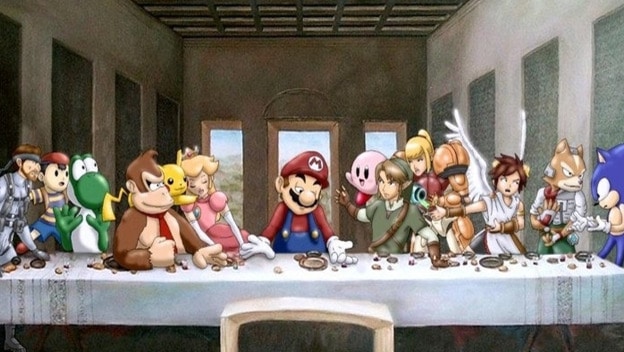Yes, videogames can have messages in them too. Direct, indirect, tangential: read into it and it will be there (mostly when you project your own perception unto it). Like movies, books and dramas, video games can also have a moral message to tell us all, and arguably, it can be done better through this medium because of its inherent interactive nature–at least that’s what I believe.
I enjoy a good moral story every now and then, and occasionally I’ll come across one that will either have a lasting impression on my perception of the world before me, or it’ll utterly change me forever. It wasn’t even a few days ago, at the time of writing, that I watched the TV-film Threads (the British version), which is quite an eye-opener in and of itself, and I believe it was even more so for the people it aimed at back in the early 80s. The message of the story is that, had nuclear war happened back then, it would most probably have lead to X, Y and Z (which aren’t good things at all). It’s not a story for the faint of heart, but it definitely serves as a reminder of what could have happened, and thus has reinforced the impression within me that the “end-result” of nuclear war amounts to ash, radiation and utter Mutually Assured Destruction.
As I was processing the film’s information and images, I couldn’t help but wonder if there are any videogames out there that may have a similar message, and I was surprised at the ones that popped into my head..
I believe video games can be more effective at delivering moral messages, because it’s the players who are forced to choose between moral or immoral acts, thus making the moral decision theirs . The inherent interactivity of videogames, I believe, makes moral messages more effective, because it’s unto the player in the end to initiate it. Reading a book or interpreting a movie doesn’t quite compare to enacting something yourself, even if it is in a virtual manner.
Sometimes it’s not even as ham-fisted as simply saying “press X to initiate ambiguous moral message to be interpreted in either way”. Sometimes a message can be more subtle or visually telling without actually being told, like in Anno 2070 .
Like mostly everything else in the world, messages are interpretable by the perception and projection of the beholder, meaning that one message can have multiple meanings from person to person. Anno 2070 struck a particular chord with me because its underlying message of burning fossil fuels vs. renewable energy resources forces you to choose between balancing the two or going for one or the other. I’m pro-renewable energies, that I’ll freely admit, so tried my utmost to make sure my cities were as green as possible.
Anno 2070 has this visual mechanic that shows how beneficial or detrimental you are to the local environment. The more beneficial you are, the more lush and green the environment looks. The more detrimental you are, the more desaturated and grey the environment looks. I didn’t want everything to be greyed out, so when my environment got a little more grey and a little less green, I would endeavour to ensure I used as little fossil fuels as possible when I constructed my cities, and I didn’t utilise the convenience of having “tried and true” methods at my disposal, albeit sometimes there are occasions where I had no choice. I believe Anno 2070’s true underlying point is to somehow moderate between the two industries whilst weaning out the burning of fossil fuels and switching to renewable energy resources.
While Anno 2070 has its tangential message of moderating resource usage through visual effect, other games can indirectly express a message without showing you, but instead just telling you. Like human psychology and mental illness in The Cat Lady .
The Cat Lady is an exceptionally dark game. To tell you the truth, The Cat Lady struck a little too close to home for me, and I think it’s a game we should all at least watch a playthrough of, because of the content and messages that it deals with.
The Cat Lady tells the tale of Susan Ashworth, a woman suffering from depression and suicidal tendencies, who has been given immortality by her perception of whatever the “Devil” is, and is tasked to rid the world of “demons” (essentially inhuman people). As she tries to get a grip of reality again with her newfound powers, she befriends a young woman who wants to rent Susan’s spare room in her rather drab apartment.
During their bonding they begin to discuss the young woman’s boyfriend, who (in a nutshell) had taken his own life because he was influenced to by an internet troll. It was during this conversation as she was explaining the full story that I had my “oh, shit” moment. I had this moment because of how “to the point” it was and how comparable it was to real-life scenarios, things that happen–or will happen–today (like suicide), and just how upsetting it truly is to anyone affected by it.
The young woman went on to describe how internet trolls are people who thrive off the “thrill” of telling someone how much they suck, saying stuff like, “ lol, go kill yourself, ” or just generally being an absolute disgraceful pain in the arse. The game hints to the receiving end of that kind of abuse, telling you what such things can do to people who are mentally vulnerable, and when those unfortunate people do take their own lives as a way to escape the torment they suffer, because they can’t see an alternative at the time. It’s a shame–a real shame. The Cat Lady’s message, in this respect, is meant to serve as an eye-opener to just how damaging cyber-abuse can inflict on a person’s psyche.
The last game I’d like to use as an example is Spec Ops: The Line . Spec Ops expresses a message that I’ve never quite seen in video games before, and did so in quite an effective manner.
Those of you who have played Spec Ops may know where I’m going with this, but for those who don’t, let me add a little context. You are the leader of a three-man squad sent to a desert storm-stricken Dubai in search of survivors. Throughout the game the main character is absolutely convinced that what he sees is real, slipping further into delusion and presses onward to find some answers to explain what went on in Dubai.
Eventually you are introduced to the weapon white phosphorus, and the tone and eerie silence in that scene communicates just how devastating this stuff is as you walk past the burning, groaning bodies in a haze of white and ash. Further down the line the main character progressively becomes less composed and less in control of the situation. Despite having a conscience on his shoulder via one of his squadmates, he presses onwards, further damning himself and his squad.

Near the end of the game, the squad comes to a point where there’s just an establishment of “enemies” between you and your destination, but you don’t have enough ammo to take them all out (I tried). The main character notices a cannon loaded with white phosphorus and decides to use it, despite the objections from the other squadmate serving as the conscience for that scene.
The aftermath of that sequence was…eerie. Very eerie. What made it really sink in for me was when I discovered that the soldiers you just burned were actually on my side, and in a small shelter, just around the corner. I see the burnt, charred remains of the survivors I had been searching for from the start, all of them captured in morbid effigies of the people who were struggling to escape the white-hot barrage as it bombarded them only moments before.
Never have videogames left me with a sinking feeling quite like I experienced when I saw that scene, at least not in recent memory. The message of that scene in particular displays a real ugliness of conflict, and gives a glimpse to what the horrors and miscommunications of war can lead to: a soldier trying to rationalize the situation when all there is to rationalize is that they’ve just needlessly and mistakenly taken innocent lives.
Yes, games were originally designed for fun. Yes, games were originally designed for escapism. However, I believe that the medium is a much more powerful platform, one where you can be put right into the boots of those who face situations and scenarios similar to those mentioned above. Message in video games, I believe, have more of an impact on us, because we are the ones interacting with whatever message the game is trying to tell us. We are the ones making it happen, whether it be of our own volition or not is a matter of narrative. It’s messages like these that can teach us, give us insight, and ultimately–maybe–open our eyes a little bit more, even if it’s just the seed of thought, like those who watched Threads back in ‘84 and turned anti-nuclear war practically overnight. We all need a good moral story every now and then.
